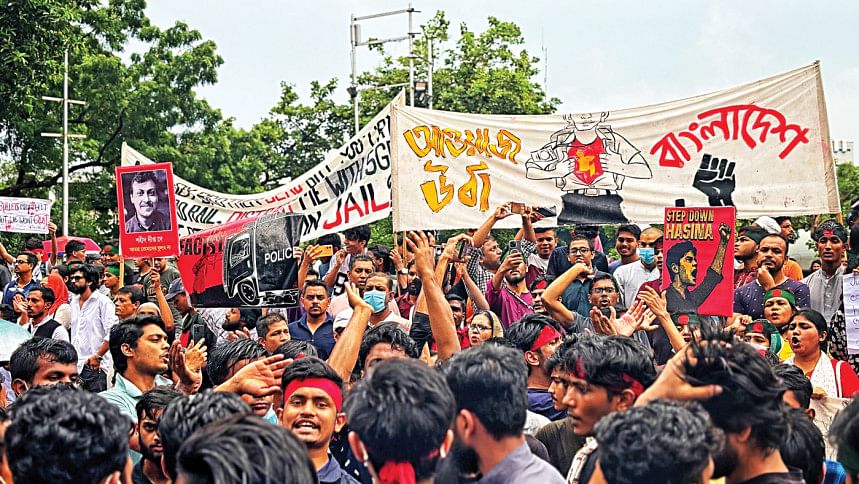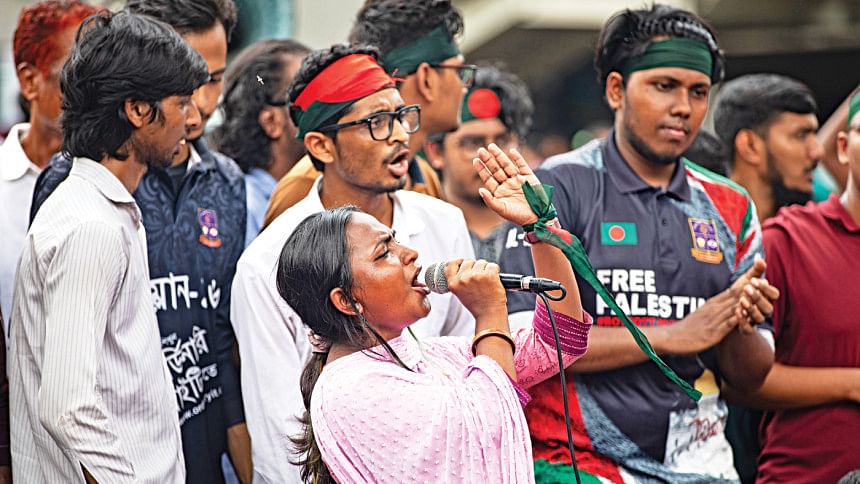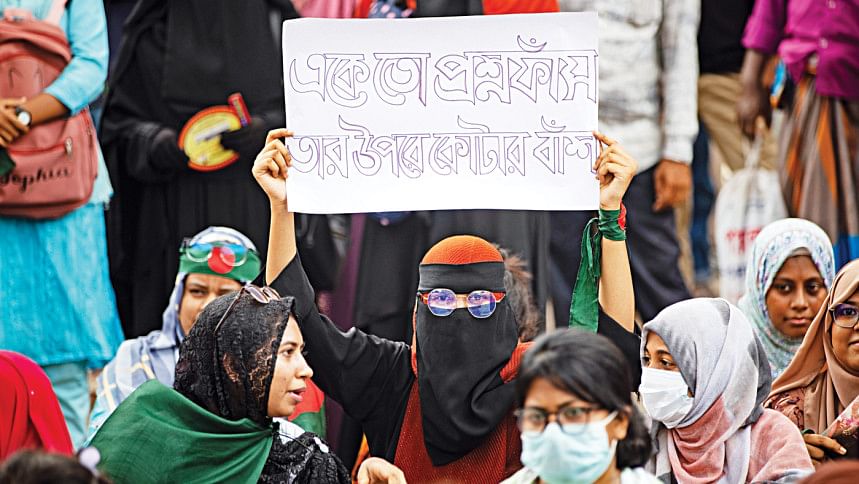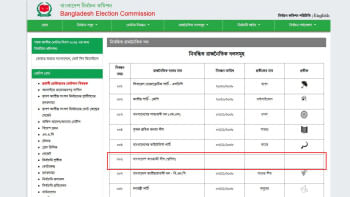How the July revolution reshaped Bangladesh’s youth

History has its moments—points of inflection where societies, seemingly stagnant and indifferent, erupt with untold energy. For Bangladesh, the July Revolution was one such moment, and an event that redefined the political history of Bangladesh. It was not just a political upheaval; it was a cultural awakening, a seismic shift that shook a seemingly apolitical generation into action. For years, we, the youth of Bangladesh, had been caricatured as indifferent to the political machinations of the country, our dreams seemingly limited to a singular escape—to leave. We were told to seek refuge in foreign lands, chasing opportunities in the West, and our departure was fueled by a belief that meaningful change was an impossibility within the borders of our homeland. The July Revolution turned this narrative on its head, igniting a spirit of resilience, hope, and ownership among a generation that had all but surrendered to cynicism.
The roots of the July Revolution trace back to early June 2024, when the Supreme Court invalidated a crucial 2018 circular that had redefined job quotas in the public sector. The Anti-discrimination Students Movement, a coalition of university students advocating for equity, inclusion, and meritocracy, responded swiftly. What began as peaceful protests for the reinstatement of a fair quota system soon snowballed into a nationwide uprising. The turning point came when the regime's security forces unleashed unspeakable violence against the protesters, resulting in mass killings. The bloodshed galvanised the nation. Thousands poured into the streets, fueled by anger, grief, and a yearning for justice. By the time the fascist regime fell in August, Bangladesh had witnessed its most significant political upheaval in decades. This entire movement was spearheaded by a group of young people. We led the movement, sacrificed our lives on the street and came back stronger than ever.
At the heart of the July revolution was a deep-seated disillusionment with the status quo. Years of political instability and inequality have fueled a growing sense of anger and frustration and we were just done with this system that deprives us of basic fundamental rights. One might as well say that July 2024 was the result of years of simmering discontent boiling over. The fascist AL regime, known for its suppression of dissent and centralisation of power, underestimated the movement's intensity. Within just a few weeks, the revolution, initially about specific reforms, had transformed into a complete reimagining of the nation's political landscape.

To understand the impact of the July Revolution, one must first confront the apathy that preceded it. For decades, politics in Bangladesh had been synonymous with corruption, nepotism, and a blatant disregard for the people's will. Politics was viewed as a swamp — murky, treacherous, and best avoided. So, we were silenced at our homes, educational institutions and social media. We were made to be afraid of these fascist forces who could not tolerate dissent. And we had examples to look back at what happens when things do not go their way. As a result of bearing witness to these systemic failures, we were forced to distance ourselves from the political arena. Eventually, we became the generation that was too consumed by social media trends, memes, and fleeting distractions to care about the state of their country.
But July changed this. And everything that happened next.
It would not be wrong to say that Gen-Z has a background of a very tumultuous relationship with politics and I do not blame us for this. You see, we have witnessed two national elections without being able to vote. We notice corruption at every step of the way. We have to deal with student politics in halls and campuses. We are tired of having things this way and hearing that they would not change. We are fed up with the idea that we either live with this or fly away in search of better opportunities. And this is precisely why an 'apolitical' group of young people all of a sudden became intertwined with state politics.
And this is solely because the discontent had been simmering. The erosion of democracy, rampant corruption, and unchecked authoritarianism were not lost on us. It just took the fire of the July Revolution to awaken us from our dormancy. We were called apolitical, but when politics knocked on our doors with batons and bullets, we answered with courage and conviction. This was not the work of seasoned activists; it was a movement led by students, first-time protesters, and young professionals who had never before set foot in the political arena. The overthrow of a government that had long been perceived as untouchable came as a shock, not just to the political establishment but to the very youth who had turned their backs on it.
What began as scattered protests over government job quotas quickly snowballed into a nationwide movement. I remember being irritated sitting in an hour-long jam due to 'just another Shahbagh protest'. Then, I remember going to Shahbagh on August 4 for the declaration of one-point demand. In the weeks between, something changed within me and all people my age. For the first time in forever, we believed that we could actually change something. This belief was contagious, just like courage, and the sudden outburst of patriotism was difficult to contain. I cannot recall the last time I felt it so strongly. So for the first time in decades, the youth were not mere spectators but active participants, our voices echoing in the streets, our demands inscribed as graffitis, and our resolve etched in history. For most of us, the revolution was a baptism of fire. We witnessed friends being dragged away by police or lost loved ones in the chaos. By the end of July, the movement felt extremely personal because it was not just about quota or jobs anymore. It became a one-shot opportunity to change the way things have always been.
It forced us to confront our own complicity in the nation's stagnation. For years, we had justified our apathy with claims of helplessness. Because what difference can one person make?. But July showed us that collective action, even if sparked by seemingly insignificant acts of defiance, could topple even the most entrenched systems. For most of us, the revolution was a mirror. It reflected the choices we had made — the times we had chosen silence over confrontation, cynicism over hope. It was humbling, even painful, to realise that apathy had been a luxury, one that could no longer be afforded. We were a generation waking up, not just to the failures of our leaders but to the failures within ourselves.
When I say we became politically active, I do not just mean picking sides. Over the past few months, we made an actual effort to learn and relearn parts of our history. We tried to understand the ideologies shaping our political landscapes and for the first time this subject matter became exciting because we were now free to discuss these things. For the first time, it felt like we were just spectators in our nation's story; we were authors. Each conversation, each act of protest, and each step forward was a line written in the narrative of a new Bangladesh.
I personally believe that the most profound impact of the July Revolution is the way it has reshaped dreams. For years, most of us dreamt of leaving the country. The July Revolution, however, instilled a sense of ownership—an understanding that the fate of Bangladesh rests not in the hands of political elites but in our own. Today, our dreams are different. We dream of reforming that system, of building a Bangladesh where future generations will not feel the need to leave. This shift is not just ideological but deeply emotional. It is a rejection of despair and an embrace of hope, a refusal to accept that our motherland is doomed to failure. It is a declaration that we are not just citizens but stakeholders, not just beneficiaries but builders.

The July Revolution was a wake-up call, not just for the political establishment but for the youth of Bangladesh. It proved that an apolitical generation is a myth, that beneath the veneer of indifference lies a wellspring of passion, resilience, and determination. It showed that the youth, when pushed to the brink, are not just capable of dreaming but of acting, not just of criticising but of creating. In the aftermath of the revolution, the youth are staying. And they are rebuilding. One crisis at a time.
Maisha Islam Monamee is a student of Institute of Business Administration (IBA) at the University of Dhaka and a contributor at The Daily Star.

 For all latest news, follow The Daily Star's Google News channel.
For all latest news, follow The Daily Star's Google News channel. 



Comments